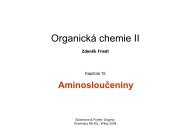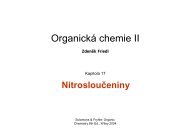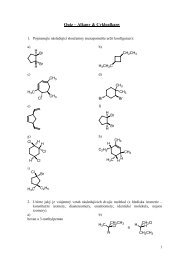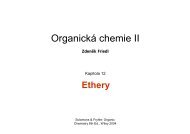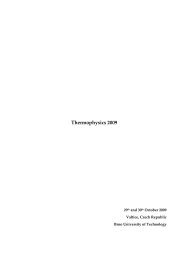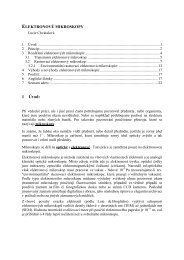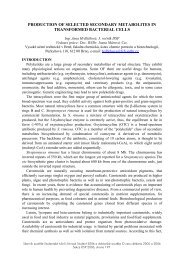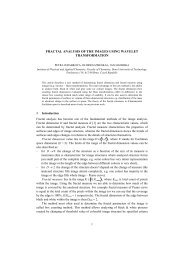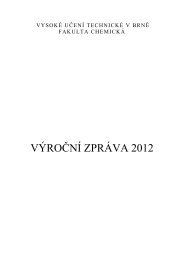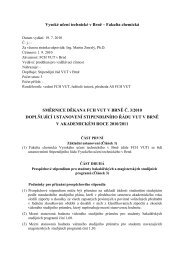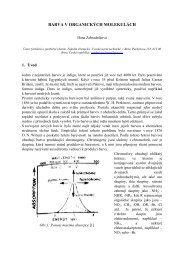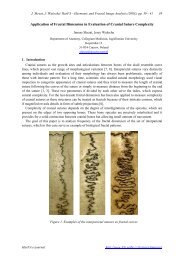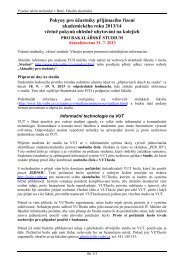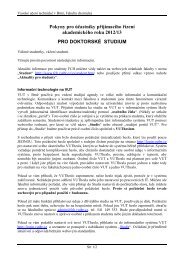2. ENVIRONMENTAL ChEMISTRy & TEChNOLOGy 2.1. Lectures
2. ENVIRONMENTAL ChEMISTRy & TEChNOLOGy 2.1. Lectures
2. ENVIRONMENTAL ChEMISTRy & TEChNOLOGy 2.1. Lectures
You also want an ePaper? Increase the reach of your titles
YUMPU automatically turns print PDFs into web optimized ePapers that Google loves.
Chem. Listy, 102, s265–s1311 (2008) Environmental Chemistry & Technology<br />
P08 ENGLISh FRO ChEMISTS CAN bE PhuN<br />
GABRIELA CLEMEnSOVá<br />
Faculty of Chemistry, Brno University of Technology, Purkyňova<br />
118, 612 00 Brno, Czech Republic,<br />
clemensova@fch.vutbr.cz<br />
“To teach or not to teach any special English tailored to<br />
serve a particular profession which in our case means English<br />
for chemists? ...Isn’t deep, substantial knowledge of general<br />
English everything one needs to be able to communicate?”<br />
Such questions are often ask by many a technically oriented<br />
colleague I meet at my workplace. To answer them,<br />
I always remember Elaine Horowitz, PhD from the School<br />
of Education of UT at Austin (TX). She openes her doctoral<br />
classes on Foreign Language Acquisition with the following<br />
definition of language competence:<br />
“Foreign language competence can be defined as the<br />
ability of authentic self presentation in that language. In other<br />
words, you can be called competent in L2 if the level of your<br />
education is reflected in the way you use this language. That<br />
means if a native speaker finds out who you are from the way<br />
you communicate.”<br />
Accepting this approach to competency we can say with<br />
confidence that English for specific purposes has its irreplaceable<br />
position in a postsecondary curriculum.<br />
ESP may not always focus on the language of one specific<br />
discipline or occupation, but it is supposed to introduces<br />
students to common features of academic discourse in the<br />
sciences or humanities, frequently called English for Academic<br />
Purposes (EAP),<br />
I would like to communicate some ideas and experience<br />
of teaching ESP classes at the Faculty of Chemistry of BUT.<br />
Our mission of teaching English for future chemists is more<br />
or less challenged by these phenomena:<br />
(i) Absence of appropriate teaching materials on the<br />
market. We have not found any material in bookstores which<br />
would fit our specific needs and could be used as an English<br />
textbook for the chemistry students. (This said with no intention<br />
to blame any bookstore, of course!)<br />
(ii) The different language experience of the students<br />
who come to our school. Their language proficiency often<br />
ranges from the true novice level to the advanced. The beginners<br />
and lower intermediate students have the possibility to<br />
attend two semesters of general English classes before they<br />
register for ESP. However, the different level of their language<br />
knowledge in the ESP classes cannot be fully eliminated<br />
as you could hardly expect them to make the leap from<br />
the beginner level to the upper intermediate or even advanced<br />
one in one year.<br />
(iii) The absolute majority of our students strongly<br />
oppose and almost detest memory based learning as they are<br />
used almost entirely to rely on their ability of logical reasoning.<br />
(“We would not have been here at BUT if we had<br />
been able to memorize. If we had been able to memorize, we<br />
would sure have studied law or humanities!)<br />
s348<br />
(iv) Students, especially in the previous years, had often<br />
a feeling that English was not their major specialization.<br />
That they did not come here to study English but chemistry.<br />
Despite the gradual change in this approach, there are always<br />
some who enter to the English classroom saying: “We are<br />
so tired from the previous instructions ...,” The laboratory<br />
classes we have just had were so tedious...”, We are just after<br />
organic chemistry/physics, math, … classes and tests, absolutely<br />
drained both intellectually and physically, please, do not<br />
want us to talk…” etc, etc.<br />
(v) Last but not least challenge is that the technically<br />
oriented students are not such good “natural speakers” even<br />
in their mother language as the students of the humanities.<br />
(“My goodness gracious, I do not know what to say even in<br />
Czech. And now you want me to communicate it in English<br />
on top of it…!”)<br />
What have we done to cope with the above mentioned<br />
challenges?<br />
Ad (i) The first step to overcome the gap in the teaching<br />
materials on the market was the creation and implementation<br />
of the teaching material of our own. At the earlier stages of<br />
our professional lives at our school we always prepared handouts<br />
and distributed them at the beginnings of the lessons.<br />
The dramatic change in our work occurred when the internet<br />
was installed into most of our classrooms. The availability of<br />
this medium made a great stimulus for us to create an internet<br />
based textbook which we called English for Chemists www.<br />
fch.vutbr.cz/ang<strong>2.</strong> When creating this material we had the<br />
following objectives in minds:<br />
The structure of our faculty – it is reflected in the selection<br />
of the topics as the subject matter of the individual lessons<br />
corresponds with the specialization of our institutes...<br />
Proportional balancing of the lesson content so that all<br />
four major skills could be developed equally. The use of 4<br />
different icons (indicating writing, talking, listening and<br />
reading) to label the individual exercises gives us a quick<br />
orientation.<br />
We tried hard to bring sound into the reading activities. –<br />
Why do we emphasize sound so much? Everybody will agree<br />
that priority number 1 in foreign language instructions is to<br />
reach fluency. Fluency can be defined as the ability to understand<br />
and speak instantly, e.g. without translating. Fluency<br />
enables us to talk easily with native speakers. They easily<br />
understand us and we easily understand them The only way<br />
how to reach it goes through listening. That means we shall<br />
not get fluency in English just by reading English articles<br />
or learning grammar rules. To become fluent, students must<br />
have a lot of understandable, repetitive listening. It means,<br />
they will not learn English only with their eyes, but they<br />
must learn English with their ears. It is important to know<br />
that powerful listening must be repetitive and understandable<br />
(A. J. Hoge). We managed to answer this demand by the following<br />
ways:<br />
•<br />
the reading sections of the textbook have been vocalized<br />
by a native lecturer




